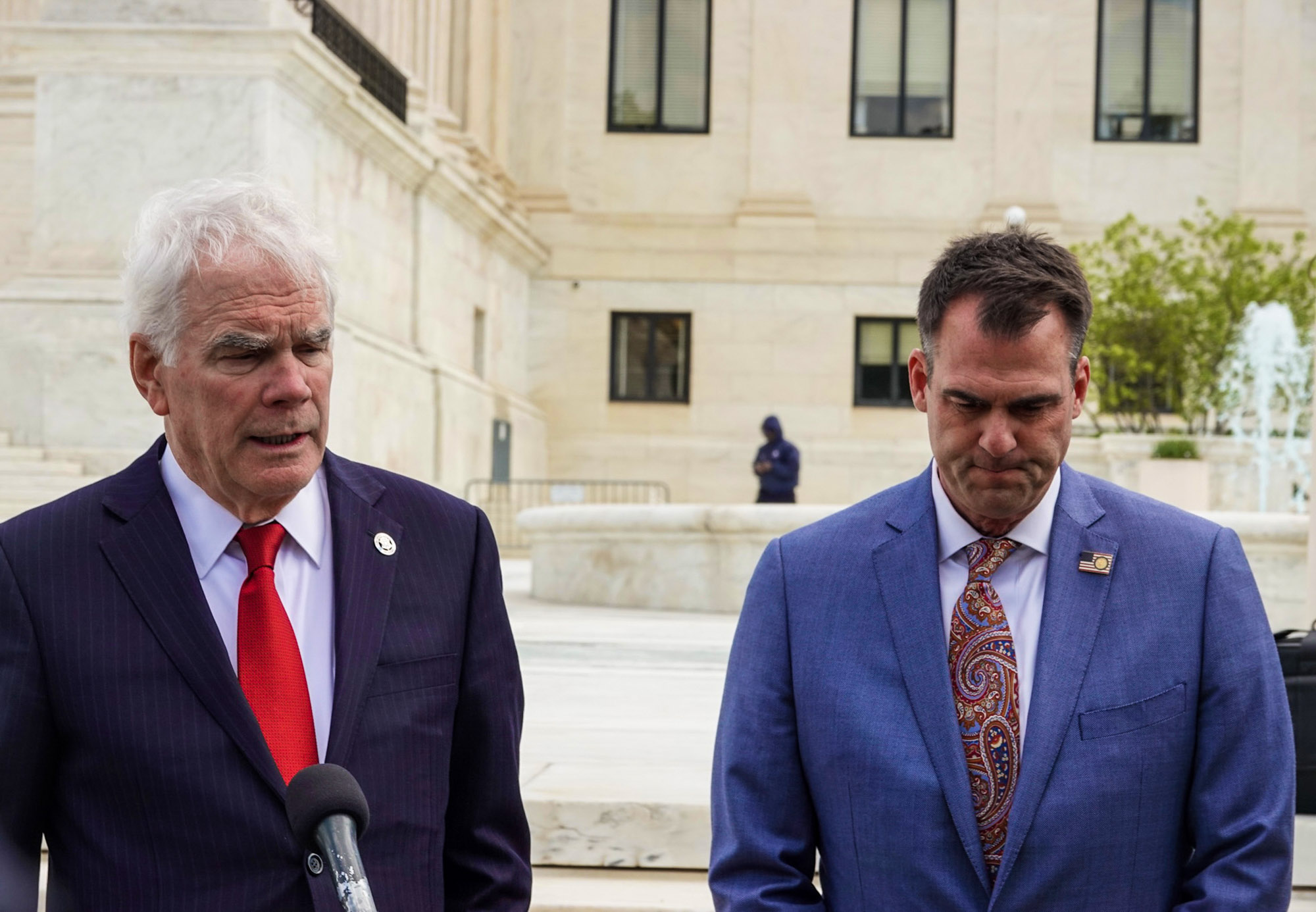Indianz.Com > News > Gaylord News: Tribes united as Supreme Court takes up sovereignty case
Oklahoma, tribal tempers flare as Supreme Court hears sovereignty case
Thursday, April 28, 2022
Gaylord News
WASHINGTON – An attorney for the state of Oklahoma told Supreme Court justices Wednesday that “thousands of crimes” have gone unprosecuted in the two years since the court removed state jurisdiction over many crimes in a large part of eastern Oklahoma.
Kannon Shanmugam said the federal government has been unable to keep up with the criminal caseload since the court’s 2020 ruling McGirt v. Oklahoma, and that the court has never determined what is “sufficient enough” to justify tribal jurisdiction in cases where the tribes ordinarily lacked jurisdiction.
But Justice Neil Gorsuch pushed back, asking Shanmugam how Oklahoma could justify its claim that it should have authority to prosecute crimes on tribal lands given 200 years of history “of states abusing Indian victims in their courts.”
“In the 1920s, Oklahoma systematically used its state courts to deprive Indians of their … property when oil was discovered on their lands,” said Gorsuch, the author of the McGirt ruling.
“We have the treaties, OK, which have been in existence and promising this tribe before the Trail of Tears that they would not be subject to state jurisdiction precisely because the states were known to be their enemies,” he said.

Stitt refuted Hoskin’s claims and implied that the tribes are unwilling to work with the state. “We cannot understand for the life of us why the tribes or, frankly, the federal government would be against concurrent jurisdiction,” Stitt said, “What is the problem with the state of Oklahoma, like we’ve done for 115 years, protecting Native victims?” He said the hearing was a “law and order issue,” and the state’s case pushed for the right to “protect citizens in eastern Oklahoma.” Stitt has maintained that McGirt has “ripped Oklahoma apart,” but has also said that if the initial decision were limited to major criminal cases it would be “fixable.” He doubled down on that stance Wednesday and described his concerns about how McGirt could affect taxes and zoning. “If we can get past, ‘It’s a reservation for all purposes,’ remember the Supreme Court said that it was a reservation for the Major Crimes Act, then we can work through it,” Stitt said. “But if this falls into taxation and zoning, again it’s disastrous for our state.” Justice Stephen Breyer questioned why Oklahoma hasn’t approached Congress for help. “I mean, if there is crime, particularly in Oklahoma, can’t they ask Congress to provide extra prosecutorial and judicial resources?” Breyer said. Oklahoma Attorney General John O’Connor said he thought the state’s position was presented “very well.” “We’re optimistic,” he said. “We think our position is well-grounded in the law.” O’Connor said the next step in Oklahoma’s fight against McGirt includes a petition for a future case to determine, “Who is an Indian?” for purposes of criminal jurisdiction, what he called a legal gray area for defendants who were not tribal members when they committed a crime, but joined a tribe later. Gaylord News is a reporting project of the University of Oklahoma Gaylord College of Journalism and Mass Communication, which has partnered with Cronkite News to expand coverage of Indigenous communities. For more stories from Cronkite News, visit cronkitenews.azpbs.org.Standing united on #McGirt. I’m proud of the efforts of @MuscogeeNation Chief David Hill as he takes on the challenges and opportunities of expended tribal sovereignty and works to protect hard fought wins. https://t.co/J2qRYtSs5v
— Chief Chuck Hoskin, Jr. (@ChuckHoskin_Jr) April 28, 2022
Note: This story originally appeared on Cronkite News. It is published via a Creative Commons license. Cronkite News is produced by the Walter Cronkite School of Journalism and Mass Communication at Arizona State University.
Search
Filed Under
Tags
More Headlines
Press Release: National Museum of the American Indian hosts Native art market
AUDIO: Sea Lion Predation in the Pacific Northwest
Native America Calling: Tribal colleges see an uncertain federal funding road ahead
Native America Calling: Short films taking on big stories
Native America Calling: Advocates push back against new obstacles to Missing and Murdered Indigenous Relatives momentum
Native America Calling: For all its promise, AI is a potential threat to culture
NAFOA: 5 Things You Need to Know this Week (November 24, 2025)
Chuck Hoskin: Cherokee Nation invests in rural transportation
Native America Calling: Native candidates make strides in local elections
National Congress of American Indians returns incumbents and welcomes newcomers to leadership
National Congress of American Indians chooses leadership at big convention
‘Not voting is still a vote’: Native turnout drops amid changes in political winds
Native America Calling: Indigenous voices speak up, but have little clout at COP30
‘It’s bull****’: Indian Country confronts challenges at largest inter-tribal conference
Native America Calling: The constant burden on tribal hunters to justify their treaty rights
More Headlines
AUDIO: Sea Lion Predation in the Pacific Northwest
Native America Calling: Tribal colleges see an uncertain federal funding road ahead
Native America Calling: Short films taking on big stories
Native America Calling: Advocates push back against new obstacles to Missing and Murdered Indigenous Relatives momentum
Native America Calling: For all its promise, AI is a potential threat to culture
NAFOA: 5 Things You Need to Know this Week (November 24, 2025)
Chuck Hoskin: Cherokee Nation invests in rural transportation
Native America Calling: Native candidates make strides in local elections
National Congress of American Indians returns incumbents and welcomes newcomers to leadership
National Congress of American Indians chooses leadership at big convention
‘Not voting is still a vote’: Native turnout drops amid changes in political winds
Native America Calling: Indigenous voices speak up, but have little clout at COP30
‘It’s bull****’: Indian Country confronts challenges at largest inter-tribal conference
Native America Calling: The constant burden on tribal hunters to justify their treaty rights
More Headlines